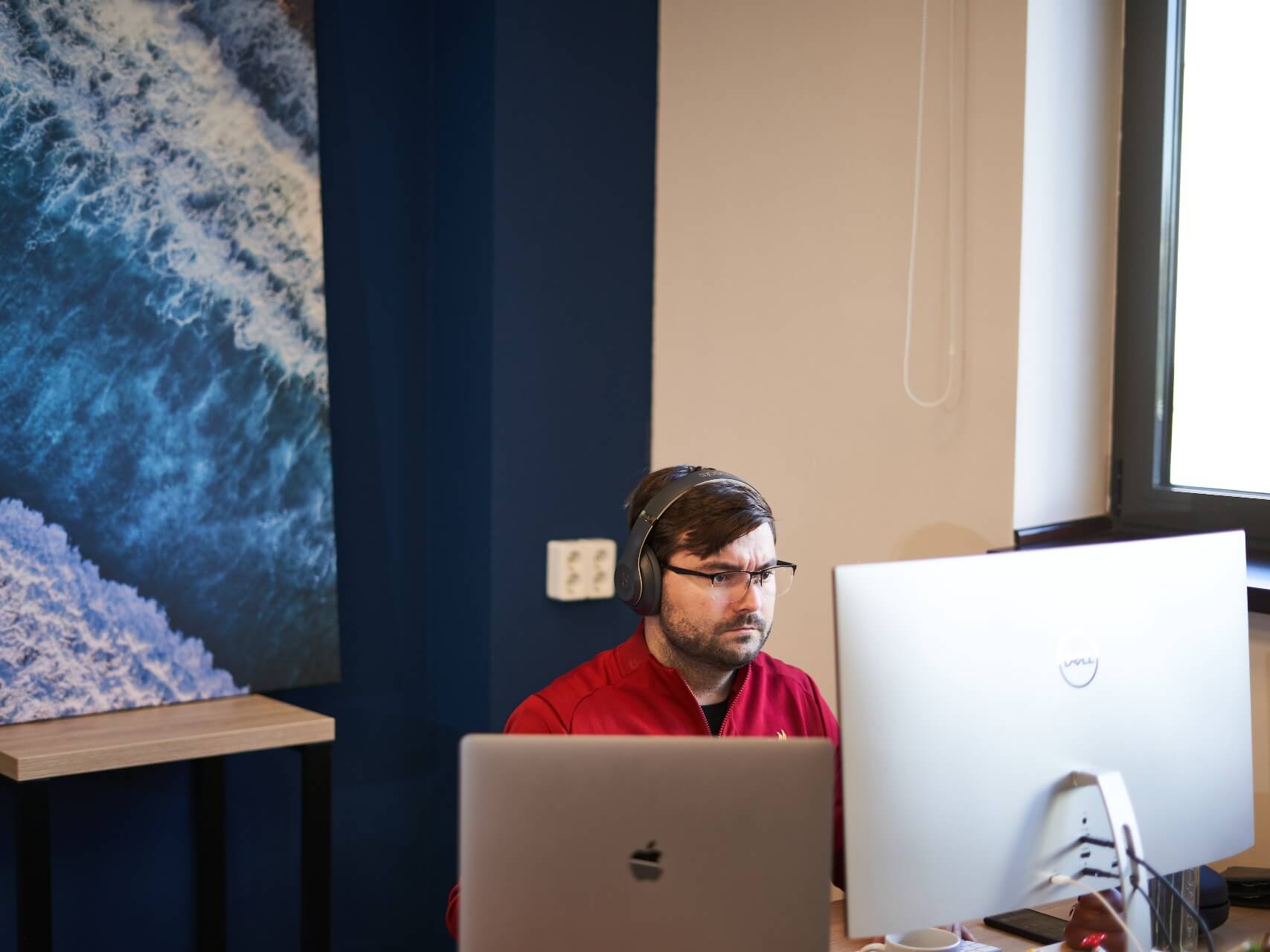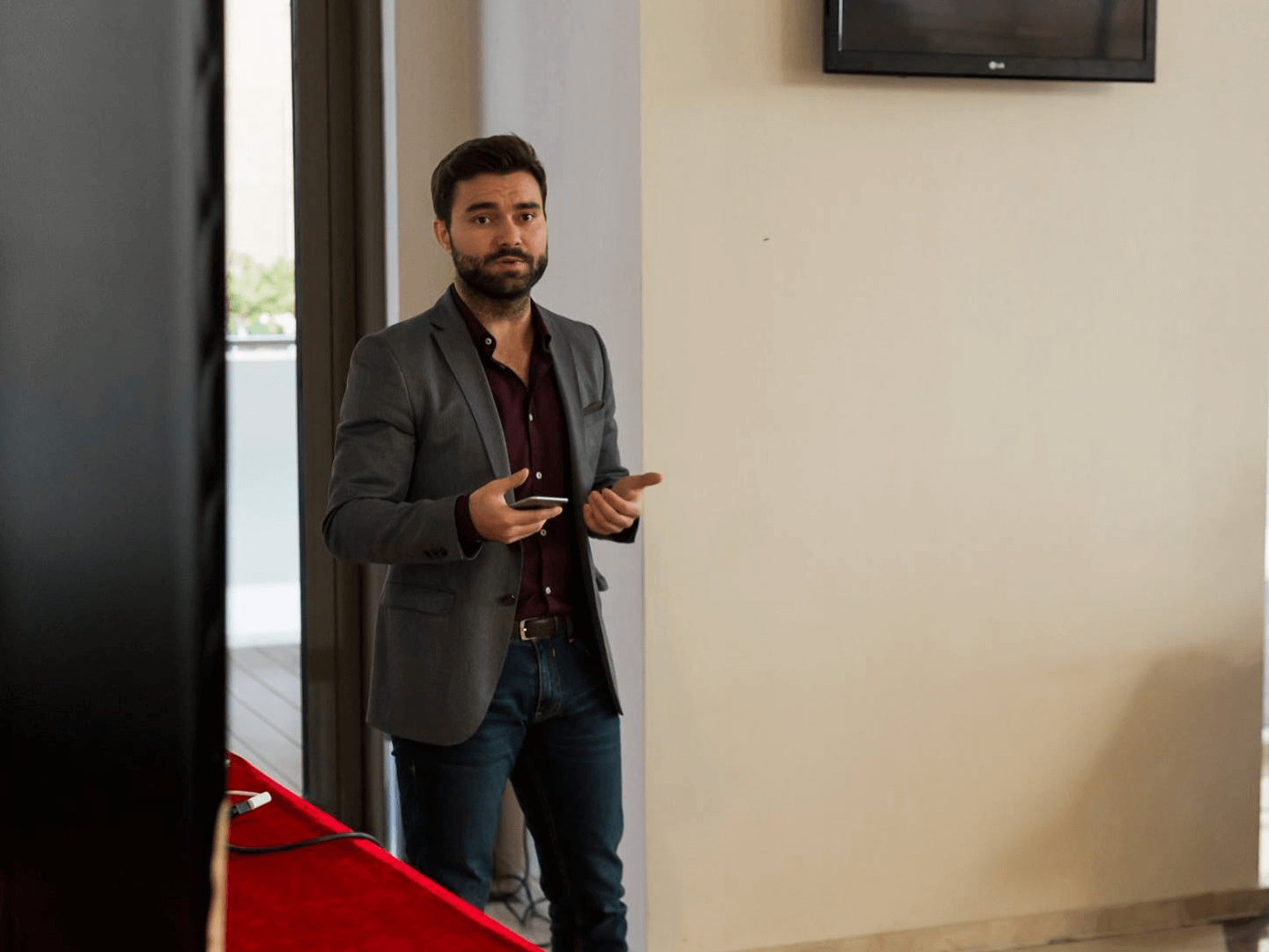Content creation, learning and growth in the software industry
Alina interviewing Ciprian, iOS Architect
Alina interviewing Ciprian, iOS Architect

He is Ciprian Redinciuc, one of our lead iOS experts, an intuitive and very critical thinker, with a sharp sense of humor and a portfolio to impress. He is the author of many technical articles here on our website and also on his own platform.
Much can be said about Ciprian, but the one thing that people first say about him is that he is really smart. And he definitely is, that and much more. One of his core values is continuous learning and we decided to ask him a couple of questions to find out how he views growth, his work, and his vision.
I started working with iOS 3.1, after the first iPad was launched. Since then I have worked as an iOS developer, but for the last 3-4 years I’ve been interested in building and launching different side projects that led me to Ruby on Rails and designing in Figma and Sketch for my mobile apps. As we speak I’m working on a Ruby on Rails project, a framework that allows developers to get a project off the ground really fast.
The language is focused on ease of use and developer happiness. Unlike many other frameworks where everything is left up to interpretation for the developer, making room for more errors, especially with beginners, this gives you a set of clear rules, making it a safer bet and a faster way to get an end product out there. It’s like an omakase menu at a Japanese restaurant, you eat what you are served, you have to trust the restaurant. Some argue that Rails doesn’t scale or that it’s too slow. Github, Shopify, and Twitter are platforms based on Ruby on Rails and they turned out to be billion-dollar businesses.
As most of my colleagues will say (smiling) I'm a pretty vocal person and most definitely opinionated. I’m not afraid of having uncomfortable conversations, especially when I know that we need to have them now in order to avoid future reworks or errors. I’m a strong believer in speaking up your mind, with solid arguments, of course (smile). I also love working with teams that are exceeding expectations, a team that challenges and has a high level of autonomy.
I have been a big Liverpool fan since 2005, all my close friends know that, I think I missed only 5 games since then. Other than that I enjoy spending time with my wife and watching shows like Rick & Morty, Family Guy, F is For Family, and most recently Bob’s Burgers. They are really fun to watch and I admire the creativity the show writers have.
I believe that there are two ways to grow as a professional in this industry. One is you can grow vertically which is hyperspecialization and learn everything there is to know about a specific area, or technology, either new or old. For example, for iOS, it can be learning SwiftUI or Combine. Another way to grow is horizontally - by learning new technologies and getting into other parts of the development world, for example learning frontend framework, or in my case learning Ruby on Rails.
I think the most satisfying thing for me, right now, is learning horizontally. I think the advantage as a developer is that you learn the basics and then apply them anywhere. This helps you easily learn new languages and frameworks. For example, on iOS, you can easily understand new technologies that are launching but in truth applying the tech can be difficult in day-by-day development unless you are doing a greenfield project. So yeah, learning horizontally will give a new perspective on development and you can apply this knowledge in your area of expertise.
Well, I think that I’ve played around with learning experiences and articles for quite some time. Alex Cristea, from the iOS NSAgora community, inspired me in this direction and also listened to a lot of podcasts from inspirational people. I think contributing to the community is a great opportunity to grow and learn together and is pretty rewarding when you see that people are actually reading and interacting with your content.
Well one of my objectives is to launch a saas business and I’ve been listening to bootstrapping for startups podcasts and it has been quite the learning journey. There is much more to growing a business than just having the idea or developing your product.

This is maybe one of the most used words in the industry. When you think about it, innovation is applying bleeding-edge solutions to existing problems and that always starts with the ability to take risks. The first need to be able to build innovation, I think, is to have the people capable of taking responsibility, and then as a product owner making sure you trust those people. More often than not business owners don’t trust their teams with taking risks, meaning there is little room for innovation. So yeah, I think having skilled people and giving them room and full trust to at least experiment with new, a bit audacious ideas is what you can call a recipe for innovation.
There are a few I can name, but the one that stands out in my mind is a banking service project. We were a young team of 5, very capable and determined to build a great product. In one year we grew the team up to 30 people and, in the end, the service was later sold for a whopping 500 million dollars. If that is not validation, I don’t know what is (laughing). This project had a winning combination: leadership skills in place, people with great skills and tech-savvy, an innovative mindset, and of course an open-minded client. I think having the client’s trust and confidence is a great boost in morale for the team and gives you just the right incentive and motivation as a developer.
The appeal of OceanoBe was always the ability to have our own software products that we can showcase to our clients. Taking the time to build something of your own, working on an idea, and involving others is a great way to make progress and stay on top of your game. It also gives you a chance to take ownership and boost accountability alongside tech skills and soft skills.
I think this will apply to everybody, not just the people already in this industry. You don’t have to have a degree to get into developing software, if you like solving problems and love technology, give it a go. There are not that many IT professionals and there is certainly room for more willing individuals. My recommendation is to just give it a go. Now you can start with a less complicated language, like Ruby, and get a taste of how it is to write code and build software, automate things, I bet that should suffice to make you want to try out programming and find a job as an IT professional. Other than that, always question what you already know or think you know and experiment with different languages and frameworks.
There is nothing you do these days that will not receive a fair amount of criticism, it’s the internet after all. Yes, it can definitely be frustrating at first but I think you should do it anyway. For us, developers, I think writing is a great exercise for you and the best way to learn and give back to the community. It’s like Einstein said: "if you can't explain it simply you don't understand it well enough”. So, just don’t care about the haters out there and try to be useful to the community.
For some time now one of my objectives now has been to develop a SaaS product, I think it’s the next logical step for me. This is a new challenge that has a mix of new skills that I can improve and perfect. It’s an exciting journey ahead.
We thank you!
In his spare time, Ciprian works on building Userdesk. Other articles that we invite you to discover on the OceanoBe blog.